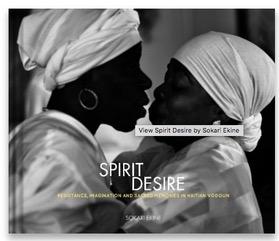Books
Events
News
Book Review: "Spirit Desire: Resistance, Imagination and Sacred Memories in Haitian Vodou"
sokari ekine
Aug 26, 2020
Sokari Ekine’s Spirit Desire: Resistance, Imagination, and Sacred Memories in Haitian Vodoun, shows Ekine’s relationship to and theorising of the lwa is directed towards and situated in Haiti and the Haitians for whom Vodou is life. Ekine has loved and lived in Haiti, and through Spirit Desire, a photographic essay, she allows the reader/viewer to enter her lived experiences with communities through an amazing set of beautiful photographic stories of Vodou. Given that Nigerian-British Ekine is known as an activist, independent scholar, blogger, community builder and editor of Queer African Reader, her powerful voice is somewhat muted here, but is clear that the quietness of the text is intentional. With ritual songs in Kreyol and English to frame some of the images, Ekine offers only a few pages to explicate the visual richness of her gentle eye. She writes:
Ayiti [Haiti]. It was here that I encountered Africa and its connection to the Atlantic. Like a piece of elastic which you can pull, and it shoots back to the starting place. Here I encountered what I had imagined when those ancestors were forced from their homes and families. I saw them in Ayiti and I knew who they were immediately. And it shocked me into temporary silence because for the ï¬rst time I came face to face with our enslaved and colonized past (2018:40).
It is clear that Vodou serves as a healing balm for the shock Ekine describes, not only for her in her extended visits to Haiti, but for the subjects in the photos, who navigate a vibrant spiritual arena, while also grappling with Haiti’s economic and political embattlements. The photos are a mix of black and white and color, mostly in portrait-style, and those photos which archive the tragic ruin of the post-earthquake landscape are refreshingly understated. Furthermore, the people photographed by Ekine are not the usual fodder for negative, anti-Black, and degrading representations of Haitians that mainstream media platforms reproduce again and again. Instead, Ekine’s subjects participate in her imaging with an awareness of and agentic relationship to the lens. Some images convey lightness and playfulness, as family members laugh and pose for the camera, some picture Vodou mambos and gender non-conforming Vodunists in stately dress and performative stances. In another set of images, two Vodunists -one feminine and one masculine -rehearse the ancient Haitian art of machete sword ï¬ghting. Several striking black and white photos document two women engaging in a ritual bath -both wearing white cloth, as one woman washes the other, the sensual, refreshing beauty of Ezili’s waters is almost palpable. Ekine’s portraits and the accompanying text represent the intergenerational, collective mutuality, and woman-centered culture of Vodou communities.
In Spirit Desire, Vodou’s everydayness is the focus and the queer feminist articulations that suture the majority of Ekine’s other published work are only subtly suggested here. The cover image of two women embracing in ritual whites is characterised by a gentle ï¬erceness. One woman holds the other, perhaps draws her in for a kiss: is either one of the women possessed by Ezili Danto? It is unclear. But what surfaces in this singular image is Vodou’s vitality.
Moving away from the resilience narratives that shadows Haitians, I ï¬nd joy, creativity, beauty, and mutual desire for the lwa from these practitioners and the lwa’s desire to twirl with us. As the resurgent interest in Vodou across the Diaspora grows, scholars, artists, and spiritual seekers will need to tread softly and respectfully toward the lwa as historical and current forms of anti-Blackness, anti-Haitianness, and the afterlives of colonization still pollute Ezili’s waters. Vodou will continue to travel despite and because of these challenges to Black humanity. As Black feminists’ guide books, Tinsley’s Ezili’s Mirrors and Ekine’s Spirit Desire surface the power of Haitian Vodou as a resource for Black feminists and queers attuned to the cultural frequencies, embodied rituals, and long-standing resistance traditions of the Black Global South.
Z’ÉTOILE IMMA is Michael S. Field Assistant Professor of English and Africana Studies at Tulane University, New Orleans, where she is also afï¬liated with the Gender and Sexuality Studies Program. Her work studies politics of gender and sexuality in contemporary African cultural contexts through an examination of literature, visual culture, performance, and new media. Through her teaching and research, Dr Imma seeks to contribute to African gender analysis, Black feminisms, postcolonial queer studies, and the larger project of decolonizing knowledge production. She has published articles in Callaloo, Research in African Literatures, Journal of Lesbian Studies, and other journals and edited collections. Email: zimma@tulane.edu
6,465

